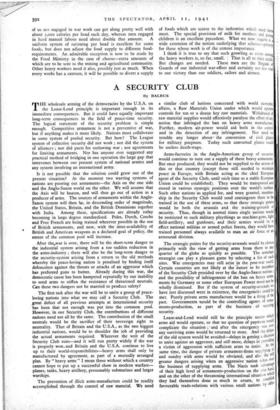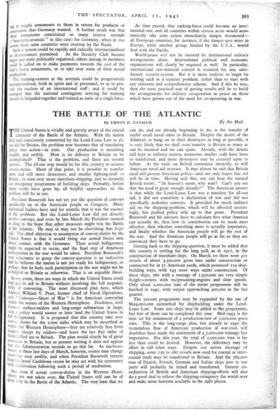A SECURITY CLUB
By BALB US
THE wholesale arming of the democracies by the U.S.A. on the Lease-Lend principle is important enough in its immediate consequences. But it could have equally important long-term consequences in the field of peace-time security. The logical statement of the security problem is simple enough. Competitive armament is not a preventive of war, but if anything makes it more likely. Nations must collaborate in some system of pooled security. But how? The League system of collective security did not work ; nor did the system of alliances ; nor did pacts for outlawing war ; nor agreements for limiting armaments. Nor has anyone ever suggested any practical method of bridging in one operation the large gap that intervenes between our present system of national armies and any system involving an international army.
Is it not possible that the solution could grow out of the present situation? At the moment two warring systems of nations are pouring out armaments—the Axis on the one side and the Anglo-Saxon world on the other. We will assume that the Axis will be beaten, and will thus go out of action as a producer of arms. The sources of armaments within the Anglo- Saxon system will then be, in descending order of magnitude, the United States, Britain, and the British Dominions together with India. Among these, specifications are already today becoming in large degree standardised. Poles, Dutch, Czechs and Free French are being trained wherever possible in the use of British armaments, and now, with the inter-availability of British and American weapons as a declared goal of policy, the extent of the common pool will increase.
After the.war is over, there will be the short-term danger to the industrial system arising from a too sudden reduction in the arms-industry ; there will also be the long-term danger to the security-system arising from a return to the old methods whereby the peace-loving nation is penalised by finding itself defenceless against the threats or attacks of an aggressor which has preferred guns to butter. Already during this war, the democratic cause has been hampered repeatedly by our inability to send arms to stiffen the resistance of threatened neutrals. Can these two dangers not be married to produce safety?
The first task after the war will be to unite a group of peace- loving nations into what we may call a Security Club. The .great defect of all previous attempts at international security has been that not enough was put into the common pool. However, in our Security Club, the contributions of different nations need not all be the same. The contribution of the small neutrals would be the sacrifice of their sovereign right to neutrality. That of Britain and the U.S.A., as the two biggest industrial nations, would be to shoulder the job of providing the actual armaments required. Wherever the writ of the Security Club runs—and it will run pretty widely if the war is properly won. and Britain and the U.S.A. continue to live up to their world-responsibilities—heavy arms shall only be manufactured by agreement, as part of a mutually arranged plan. By "heavy arms" I mean those without which a country cannot hope to put up a successful show in modern warfare— planes, tanks, heavy artillery, presumably submarines and larger warships.
The prevention of illicit arms-manufacture could be readily accomplished through the control of raw material. We need a similar club of nations concerned with world economic affairs, a Raw Materials Union under which would operate controls for ten or a dozen key raw materials. Withdrawal of raw material supplies would effectively paralyse the effort of any nation that infringed the ban on heavy arms manufacture. Further, modern air-power would aid both in the control and in the detection of any infringement. Nor need ice trouble any longer about the conversion of civil planes for military purposes. Today such converted planes would be useless death-traps.
Arms-factories in the Anglo-American group of countries would continue to turn out a supply of these heavy armaments. But once produced, they would not be supplied to the armies of this or that country (except those still needed to maintain peace in Europe, with Britain acting as the chief European agent of the Security Club, until stich time as a stable European Union could be established). They would be transported and stored in various strategic positions over the world's surface. Such other nations as applied for, and were granted, member- ship in the Security Club would send contingents there to be trained in the use of these arms, so that these strategic points would be both the arsenals and the training-grounds of security. Thus, though in normal times single nations would be restricted to such military playthings as machine-guns, light field-artillery, and gunboats, and their armies would he in effect national militias or armed police forces, they would have trained personnel always available to man an air force or an armoured division.
The strategic points for the security-arsenals would be chosen primarily with the view of getting arms from them to any quarter of the globe as quickly as possible. The armchair strategist can play a pleasant game by selecting a list of such sites. War emergencies may still arise in the post-war world. Certain countries are not likely at the outsetto be members of the Security Club presided over by the Anglo-Saxon nations ; and the possibility of infringement of the ban on heavy arma- ments by Germany or some other European Power must not be wholly dismissed. But if the system of security-arsenals ue have just discussed were in existence, the emergencies could he met. Purely private arms manufacture would be a thing of the past. Governments would be the controlling agents of arma- ments-production, as part of the business of securing security.
Lease-and-Lend would still be the principle under which arms aid would operate, so that no question of payment would complicate the situation ; and after the emergency was °ver any surviving arms would be returned to store. And the delar of the old system would be avoided—delays in getting a decision to unite against an aggressor, and still more, delays in providing a victim of aggression with sufficient arms to resist. At the .same time, the danger of private armament-firms supplYing and sundry with arms would be obviated, and also the sla' greater dangers arising when an aggressive 'nation takes over the business of supplying arms. The Nazis took advanl4! of their high level of armaments-production on the one 110'1 and on the other of the threatening international situation whi,c! they had themselves done so much to create, to establisll favourable trade-relations with various small nations by offer. jag to supply armaments to them in return for products or concessions that Germany wanted. A further result was that these armaments constituted so many reserve arsenals ( insecurity-arsenals " in this case) for Germany, when in due course these same countries were overrun by the Nazis. Such a system could be rapidly and radically internationalised is circumstances permitted. As the Security Club became larger and more politically organised, others among its members could be called on to make payments towards the cost of the dub's heavy armaments, or to take over some of their actual production. The training-centres at the arsenals could be progressively internationalised, both in spirit and in personnel, so as to pro- vide the nucleus of an international staff ; mid it could be arranged that the national contingents arriving for training should be brigaded together and trained as units of a single force. As time passed, that striking-force could become an inter- national one, and all countries within certain areas would auto- matically take joint action immediately danger threatened— all European countries, for instance, if the danger-spot were in Europe, while another group, headed by the U.S.A., would deal with the Pacific.
World-peace will not be ensured by international military arrangements alone. International political and economic organisations will clearly be required as well. In particular, international raw-material control is essential for any satis- factory security-system. But it is more realistic to begin by treating each as a separate problem, rather than to start with any elaborate and comprehensive scheme. And if this be true, then the most practical way of getting results will be to build the arrangements for military co-operation in peace on those which have grown out of the need for co-operating in war.































 Previous page
Previous page